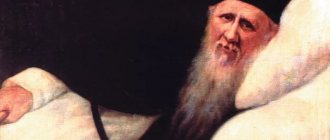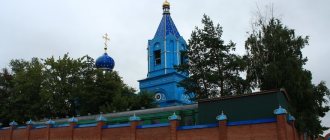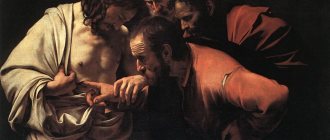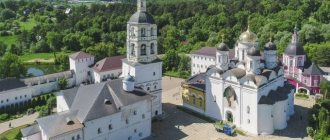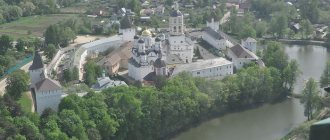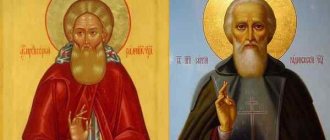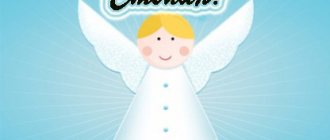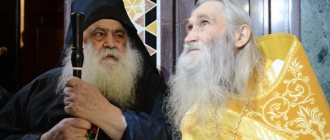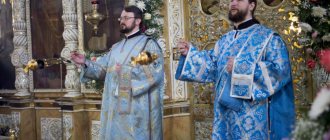Faces of Athos
Part 1
Father Stefan
This is Serbian Father Stefan, who also lived on Karuli. Father Stefan spent about forty years there in the cell where Elder Sophrony (Sakharov) lived during World War II. And where, most likely, he began to write a book about Elder Silouan. There's a cave behind there. In this cave, Stefan built a small artificial lake, and in winter he collected rainwater, and in summer he watered his flowers with it. He truly had a Garden of Eden!
| Father Stefan |
It seems to me that he was acting like a fool (although some say that he was delusional).
During the war, Father Stefan was in Žić, and Bishop Nikolai (Velimirović) ordained him as a deacon. One day, at the very end of the war, the communists wanted to shoot him, he jumped into a ravine and ran away from them. For such “merits”, for his connections with Bishop Nicholas, the Serbian heir to the throne respected him, there was correspondence between them (I saw his letters to Father Stefan). Father Stefan was a man of monstrous physical strength! He could drag logs weighing one hundred and fifty kilograms each along the winding path to him from the sea. He served the Liturgy every day and, as a rule, alone (which, as you know, is not allowed according to the canons; he was condemned for this). Taking out particles at the proskomedia, he commemorated people. I brought him names, and then a year or two later he asked me again: “What about that one, and what about that one?” I had already forgotten who I wrote to him, but he kept praying for them. I remembered a thousand names every day! And he told me: “The Divine Liturgy is such a great thing! If I had known that the last liturgy on earth would be celebrated in South America at that time, I would have immediately gone there on foot to attend it. Because liturgy is everything. She holds up the world."
He complained that our world had fallen, and even on Mount Athos there was no more grace: “I got up at night and read the rule before the liturgy. And there, behind the ridge, the moon is approximately as it is now. I see that grace has risen, and shows with its hands, and left. Only a little of it remains here, on Karuli.” One day, in the small church of St. Sava of Serbia (which he himself built), St. Sava appeared to him, praised him and said: “Stephen, we are waiting for you. You will come to us sooner than you think.” Stefan recalled: “I felt so good. And then he woke up and began to think: “What does it mean: earlier than I thought? I expected to live another thirty years. What does earlier mean? Fifteen? Well, that's so much, so much! We still have fifteen years to live!”
He fed titmice and various small birds.
He will call: “Tsi-chi! Tsi-tsi!” – and they would fly and sit on his arm. This was very tempting to his smoky cat, who then did: “Ooh! Ooh!” But still I never encroached on the birds! I have watched such scenes many times, sitting quietly on the sidelines. Father Nestor
This is Father Nestor, a former hunter. On Mount Athos, he walked through the forests and collected medicinal herbs. He lived high up, in an abandoned cell above Kerasya, where a Russian monk from Siberia, also a former hunter, now lives. Apparently, this is a “hunting place”. In winter, snow stays there for quite a long time. Nestor always had a supply of medicinal herbs, and what remained of his “hunter” was that he willingly shared his herbs.
About prayer on Mount Athos
There are not so many hieromonks on Mount Athos. Even if two or three people live together, they often do not have their own hieromonk. How to serve? According to the books, with priestless rank. They read a lot by heart, especially the illiterate. Once, my friend Melchizedek and I went for a walk and found a pagan altar near Krio Nero, just above Paleokastritsa, above a ravine. And behind it there is an abyss - two hundred meters. And so we sat there and looked down at the sea. Suddenly, from Kerasya, monks with loaded horses walk along the path towards Kafsokalyvia and read Vespers. We read Vespers and began Compline. Everything by heart. And so we went down a steep path.
Now in Karuli there are many Serbs, Russians, and Greeks who read the rosary - these are the followers of Elder Joseph of the Cave.
There are more and more of them, but at the beginning of the twentieth century there were few of them. Everything is individual. Some follow the rules that, say, the evening service - so many rosaries, compline - so many. But the old monk Clement in St. Anne, for example, says that this is bad. Because when you count prayers, you try to say them quickly in order to quickly fulfill the rule. And then the meaning is lost. When I was a novice, I once met him on the path, and he asked me how many prayers we read, I answered. He says: “Oh! It's too much. It is better for you to pray not by the rosary (in the sense of quantity), but by the clock. And no matter how many prayers you have time to read, the main thing is that you pray sincerely. Otherwise, imagine a hunter who took a gun and started shooting - “boom!” boom! boom! boom!" - so what? So nothing will work out for him. You have to aim carefully, and only then pull the trigger.”
I have friends who read prayer at night for four hours straight. If you get tired, then you ask with words coming from your very heart: “Lord, do you see what I am like? I want to become better, but I can't. Help me learn to love." And after several minutes of such prayer, you continue to say the Jesus Prayer. It is precisely this mood that is most important, and not to argue about unimportant things: someone reads twenty thousand Jesus prayers a day, and someone slows their breathing so much that they barely have time to read two or three hundred. But if you breathe so slowly, this in itself is a lot of work, and again the meaning slips away. I was taught to slow down my breathing, but in such a way that I did not complicate the breathing process itself and was not distracted by it, but it was better to think from time to time: “Why am I doing this? What do I want to achieve? And then the attention focuses on the fact that I want to change myself, become better, transform, learn to love others. And if this does not happen, then what is my prayer for? For pride? To say that I read twenty-five thousand prayers a day?!
Father Arseny
This is the cell of Father Arseny. Above the sea. Two paths lead to it - both are difficult to pass, you walk more with your hands than with your feet. And Father Arseny is already over seventy! He does handicrafts - he makes covers for books (special equipment and various presses remain from the Russians who lived in this cell in the nineteenth century). On hard covers he skillfully places stamps in the form of a cross.
Nicodemus and Jonah Russians
And this is Russian Nikodim. One of the last pre-revolutionary Russian monks who lived on Karuli. He died in 1984. Before his death, already ill, he lay mostly in bed, but received guests. Once he told us: “You see, I’m lying in front of you so weak. I was once a strong person, I could do anything, I read a lot, I knew a lot. And now I don’t know anything, the Lord took everything, all the words, except one small prayer: “Lord Jesus Christ, Son of God, have mercy on me.” That’s all I remember.”
| Father Nikodim |
There is an interesting brochure that testifies to how in the 1930s and 1940s the Jesus Prayer took place among Russians on Mount Athos, how Father Nicodemus and his elder labored in the Jesus Prayer, and what temptations they experienced.
The former Pskov-Pechersk monk Jonah came to Father Nikodim. I saw him two or three times at patronal feasts in different monasteries. I especially remember how in Iveron, after the liturgy, everyone walked with the icon to the place where it was found. It is three to four hundred meters from the monastery, on the seashore. People carried the icon, replacing each other. And Father Jonah managed to hold her all the time. He could give way to someone, but after a few seconds he again carried the image himself.
One day I was walking from Stary Russik towards the Panteleimon Monastery, and I saw a path going off to the left. I got curious and turned around. A kilometer later I saw a cell, beehives and a monk who was working with bees in a mask. When he lifted his mask, I realized it was Father Jonah. He was delighted: “It’s so good that you came.” I began to apologize: “Sorry, you’re probably more used to being alone here.” And he: “No, people come in. Well, a year ago a policeman came. I was looking for mushrooms here, or something. And he went in." Father Jonah left me to spend the night in his cell: “It’s better with two. We can read the akathist antiphonally.” In the morning he suggested: “Wait, let’s have lunch, and then move on.” He cooked lentils in a saucepan and for some reason hesitated. Walks back and forth in confusion. Then he tells me: “You know, I don’t have any plates. But when we lived in the village, we ate everything from one pan. If you can, we will eat it this way. And if not, then first you sing, and then I.” There were no problems for me: where I lived, in the Karakal Monastery, all the remaining food was collected from the plates and then served again. We got used to it and didn’t disdain each other. Hearing this, Father Jonah was happy, put the pan on the table, and we ate.
He spoke very well of Father Nikodim, although he belonged to the Church Abroad, which at that time on Mount Athos was completely different from the Zealot group, which did not want liturgical communion with the Panteleimon Monastery.
Father Nicodemus gave Jonah notebooks with instructions on the Jesus Prayer. Then I found many similar notebooks in abandoned cells. The main part of them is general, but there are options. It can be seen that all editions were copied from the same source, most likely from the end of the nineteenth century. But each time the scribes added their own experience. Unfortunately, much has been lost. In those days, our Slavic monasteries were very disorganized, library work was poorly done. Now it’s much better in Hilandar and, probably, in Panteleimonovsky too. But then only in Simonopetra the archives were carefully treated. There I took all the notebooks I found. A place was immediately assigned to them there. And when I returned later and wanted to read them, they were brought to me within ten minutes. Therefore, I do not regret that I donated the Russian notebooks to Simonopetra’s library. Everyone can find them there and work with them! I am preparing one notebook from the turn of the nineteenth and twentieth centuries for publication as an example of the Athonite attitude to the Jesus Prayer. There you can see all the problems that have arisen in connection with the veneration of the name of God. Romanian Melchizedek
I really like to tell about him an incident that I myself witnessed. I once visited him during Lent. His house is two-story, with a room on each floor. They are not connected to each other; you ascend to the floor via an external staircase. He lived in his room, I in mine. We ate once a day, collected herbs and ate them. And after eating they went back to their rooms. After three weeks of Lenten silence, a knock was heard during a meal (a hundred meters from the cell there was a piece of iron with an inscription in several languages: “Knock here”). I saw how the face of Father Melchizedek changed because he understood: now someone will come and break our silence. This was the first visitor in three weeks. A young man, a Greek officer, enters, brings a backpack full of lean foods and thanks Father Melchizedek. For what? Several months ago, this officer came to Athos to pray for his mother, who was dying in one of the Thessaloniki clinics. The officer walked around Mount Athos; he also visited Elder Paisius. On the ship, a monk (it turned out to be Melchizedek) approached the officer, seeing his despair. He then left the Mountain once a year to sell his handicrafts. A conversation began between them, the officer asked for his prayers. Two days later he returned to Thessaloniki, and at the clinic the doctors told him: “This is a miracle! Your mother is better!” And my mother said: “I felt better in the middle of the night. I woke up, and there were two monks near the bed. One old, one young” (at that time Melchizedek was still relatively young, about thirty-five years old). “They disappeared, but this good condition remained.” Melchizedek became embarrassed, looked in my direction and said: “Well, you see what prayer means. I turned the rosary a couple of times, and the Lord gave everything.”
After this incident, the next day I left his house, went down six hundred meters lower into the cave, because I realized: he is a real hermit and simply meekly sacrifices his solitude for me. He once told me that “most monks cannot stand complete solitude, and after some time they themselves desire visitors. But this means something is wrong: if you feel discomfort from being alone, you are not a hermit.”
On Mount Athos, working to earn money for food is enough for two to three weeks a year. Melchizedek knitted rosaries and crosses, and sold his handicrafts to monastic or church shops. Came out once or twice a year. With the money he earned, he bought flour, olive oil, lentils, beans, and brought these products to his place, locked himself tightly and lived alone. If he earned a little more than needed for food, he bought patristic and theological books. So here it is: a hermit is a monk who has freed himself for the present in life.
Continuation
Father Stefan
Father Stefan is young. And he is also celibate. There is such a rank in the Orthodox priesthood. He refused to tie the knot, but either he didn’t have the strength to become a monk, or he left it for “later,” but be that as it may, the time used by the white priesthood to take care of the family was reserved for Father Stephen.
That is why His Eminence issued a decree where three parishes in the north of the diocese were assigned to the leadership of Priest Stephen. Simultaneously. With the wording: “rector of temples.”
The northern part of the metropolitan estate corresponds to the concept of “north”, since it is sparsely populated, poor and ruined in recent years. All careless clergy are sent here from rich, industrial, southern cities for correction and admonition.
Father Stefan was not negligent. He was energetic. I managed everything. Serve as expected and when required, fulfill the requirements in an acceptable manner, teach Sunday school and read books.
The long priestly braid and fluttering tails of Father Stephen's cassock are constantly present everywhere in the parish, so swift are his movements, quick speech and energetic actions. He flies up the steps, raises exclamations ringingly and loudly, he can sing prayers and memorial services himself, because the choir is not always able to perform the irmos and troparia by chanting a Cossack marching song, that is, in a voice that corresponds to the essence of the young priest.
The rectors of the churches where Priest Stephen was assigned by decree, after two or three months of his service, went to the diocese with a request to return to their parish the peace and tranquility that had been completely lost under the energetic and restless cleric.
Having received his rector’s appointment, Father Stefan put all his simple property into two aluminum boxes, which he simply called “cargo 200,” and went to the regional department of agriculture. In 10 minutes, he proved to the responsible official in charge of the area of the future ministry that, although he does not wear a cross around his neck and keeps a “obscene” calendar in his office, he must still provide him with transport to move to his destination. The official immediately found the car and helped load it himself, and after the applicant’s safe departure, for a long time he could not understand why he did this. Also, the fact that there was a torn colorful wall monthly with “Miss Ukraine 2004” in the trash bin could not be determined.
The three churches, the care of which were now entrusted to the young abbot, were located a couple of ten kilometers from each other. One of them, the central one, is in the former building of a regional veterinary hospital, which was closed as unnecessary due to the lack of patients. The second, in a typical church of the 19th century, made of red brick from the tsarist years of production and therefore preserved, since it is impossible to break the masonry of the great-grandfathers even with explosives. This temple was beautiful, solid, prayerful and historical, but there was no roof on it, and acacia bushes grew on the remaining ceilings, above the altar. The third parish of Father Stefan appeared before him in an extremely picturesque form. On the shore of a large pond (“staka” in the local language), completely filled with quacking and cackling birds that live on a private, recently built poultry farm, one and a half hundred reinforced concrete blocks were neatly stacked, and there was a wooden cross driven into the ground. “Boris and Gleb Church” is written on the cross in white paint.
Having surveyed the property, Father Stefan settled into a two-room apartment, or rather, in the former waiting room of a veterinary hospital, converted into housing, and for half an hour he beat the hanging empty gas cylinders that carried the sound of bells. Quite a lot of people came, although half of them were simply out of curiosity: to look at the new priest and stop the long ringing, disturbing the quiet, measured flow of life in the district urban settlement, which stands for “urban-type village.”
Essays
- “Russian Orthodox mission in Urmia (1898-1918): [Doc. at the conference "Christian missions in the XVIII-XX centuries." Moscow, May 16-18, 1995]”, Christian Reading
, M., 1996, No. 13, p. 73-112: - “Professor of SPbDA V.V. Bolotov and the question of the rite of reception of the Nestorians’ reunification with the Russian Orthodox Church at the end of the 19th century. [Doc. for the anniversary conf. SPbDAiS. 25-26 Dec. 1996]", Christian Reading
, M., 1997, No. 14, p. 97-123. - Materials for the biographical dictionary of Assyrians in Russia (19th - mid-20th centuries)
, (2nd ed.), 2006. - "Jonah [Mar Ionan bar porridge Maravgin]", Orthodox Encyclopedia
, vol. 25, p. 437-438: - "Letters to St. St. Nicholas of Japan Sergius Suzuki", Christian reading.
Saint Nicholas of Japan. Letters to priest Sergius Suzuki: (from unpublished) , 2012, No. 5 (special issue), p. 10-14: - “Memories of the Father”, official website of the St. Petersburg Theological Academy, May 1, 2022:
